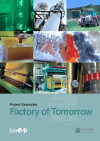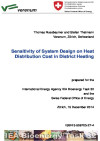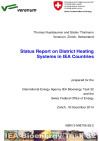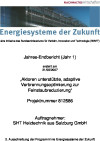Suchergebnisse für "Factsheet: Energietechnologien gestalten, die für alle sinnvoll und nutzbar sind"
IEA SHC Task 59/EBC Annex 76: Deep Renovation of Historic Buildings - Towards lowest possible energy demand and CO2 emission (nZEB)
The goal of Task 59 was to document international best practice examples (knowledge base), develop a multidisciplinary planning process, and develop holistic retrofit solutions for historic buildings. As a knowledge base, the Historic Building Retrofit Atlas (www.HiBERatlas.com) emerged from the project. In the HiBERatlas more than 55 best practice examples are documented. In addition to the management of Subtask A (Knowledge Base) and Subtask C (Conservation compatible retrofit solutions & strategies), innovative technical and organizational retrofit solutions, which have already been applied in national demonstration projects and tested in practice, have been incorporated and further developed through the Austrian participation.
Erfolgreiche Beispiele aus der Programmlinie Fabrik der Zukunft

Herausgeber: Bundesministerium für Verkehr, Innovation und Technologie (BMVIT)
Englisch, 36 Seiten
Downloads zur Publikation
Enerspired Cities - open and harmonized infomation basis for energy oriented urban planning
In "Enerspired Cities" the concept for an automized junction of judicial secured access regulation to (geo-)energy data is elaborated. This will be adapted to the specific situations in the cities of Innsbruck, Salzburg and Vienna and implemented in dedicated pilot applications. The declared aim is the support of urban planning, monitoring and research by an easy and transparent access to base data coming from various sources for a wide range of users.
Ecological restoration of a listed building with passive house technologies
Ecological exemplary reconstruction of the "Haidenhof"-building, Bad Ischl, Upper Austria. Building refurbishment with respect to monumental protection and newest passive house technologies. Reorganisation of the former residential building to an academy of arts and culture.
Production and upgrading of fermentation gas at the location Wals-Siezenheim to be feed into the natural gas distribution network
Production and multistage purification process of approx. 150 m³/ h biogas in Wals-Siezenheim. Prove the feasibility of trouble-free feeding of biogas into the natural gas grid of the Salzburg AG within an operation period of 3 years.
Interregional Logistics- and Procurement Network for Forest Fuel in Austria
A concept for a cooperative forest fuel supply chain network for a large part of Austria (regions of Salzburg, Upper Austria, Lower Austria, Vienna) is developed in order to minimise transport-, storage- and total system costs while simultaneously increasing supply guarantee for the plants.
"Building of Tomorrow" on the road - knowledge transfer of the results from "Building of Tomorrow" to existing traineeships
Knowledge transfer of the programme "Building of Tomorrow" to specialists on universities, advanced technical colleges, polytechnics, construction academies, administration academies. Themes: Energy, Construction and Building Physics, Ecology and Architecture and Sociology.
baubookPlus - Expansion of an extensive knowledge database of sustainable buildings
By the foundation of the baubook GmbH in 2008 the two databases of building products "öbox" and "ixbau.at" have been merged. The new database baubook was expanded. Essential functions (central product declaration, decentral quality management) and fields of products were added.
BuildReUse ‐ 100 percent re‐use and recycling in buildings with short usage cycles
Some buildings, such as supermarkets or office buildings, are often demolished and rebuilt after a few years or at least have their interiors changed, turning large quantities of building components into waste. The BuildReUse project aims to develop circular economy concepts for these buildings and to promote the necessary change in the construction industry.
Sensitivity of System Design on Heat Distribution Cost in District Heating (2014)

IEA Bioenergie Task 32
Thomas Nussbaumer, Stefan Thalmann
Herausgeber: Verenum und Schweizer Bundesamt für Energie
Englisch
Downloads zur Publikation
Status Report on District Heating Systems in IEA Countries (2014)

IEA Bioenergie Task 32
Thomas Nussbaumer, Stefan Thalmann
Herausgeber: Verenum und Schweizer Bundesamt für Energie
Englisch, 48 Seiten
Downloads zur Publikation
Developing of a application for central visualisation of the energy and resource demand in a private household "ZENVIS"
The main focus of the research project ZENVIS is set on the analysis of the benefits provided by a "visualization device", which gathers the readings of energy and resource consumption (electricity, gas, water, heat energy and fuel consumption). This device ought to find its use in households and to allow the consumer to observe and to control his energy consumption.
Aktoren unterstützte, adaptive Verbrennungsoptimierung zur Feinstaubreduzierung

Dipl.-Ing. Herbert Hartl, MBA
Herausgeber: Bundesministerium für Verkehr, Innovation und Technologie
Downloads zur Publikation
Multifunctional energy solutions in tourism
Multifunctional energy solutions for the tourism-region Alpendorf: Increasing energy efficiency, use of renewables, organisation measures considering existing cooperations.
Inter-linked design as a strategy towards sustainable buildings - removing deficiencies of learning and of diffusion

The aim is to investigate the role of inter-linked design team organisation in the design of sustainable buildings and to formulate ready-to-use recommendations and guidelines for dissemination.
Urban district heating extended – Development of flexible and decarbonized urban district heating systems
Development of innovative urban district heating systems by integration of long-term thermal storage, large scale heat pumps, large scale solar thermal installations, waste heat recovery and analysis and evaluation by simulation. The results of this project will provide templates for technology selection, system design and merit order for new urban district heating areas.
Ecological Passive houses

Discussion of transfer of know how for ecological passivehouses, networking (national and international)
Ecoleasing for technical commodity goods - Models of use on the example of abrasives
The aim of the project is, to come to general expressions on one hand of the market potential and on the other hand of the restrictions for ecoleasing in the field of technical commodity goods. Within the project an evaluation on the relevance of ecoleasing for the sustainable development will also be done.
School vent cool - Ventilation, cooling and strategies for high performance school renovations
Based on a building typology, strategies for prefabrication for high-quality thermic-energetic renovation of school buildings were developed. New solutions for ventilation systems to achieve good air quality and shading systems were analysed and tested. The "School vent cool" method for renovation of schools has been developed.
Development and application of an consultancy model to promote sustainable building design

Development of an consultancy model to promote ecologic and economic sustainable building solutions within the planning process. Analysis of the efficiency of guided (integral) meetings with architects, planners, and experts for different items.
